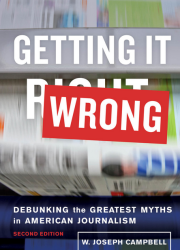In a time of “fake news” circulated by shadowy Web sites, you’d think mainstream media would be extra-vigilant about not trafficking in media myths, those appealing tall tales about the exploits of journalists.
Not so the Washington Post, which repeats the mythical anecdote about William Randolph Hearst’s vow to  “furnish the war” with Spain at the end of the 19th century.
“furnish the war” with Spain at the end of the 19th century.
The Post’s blunder appeared in a review posted yesterday of The True Flag, a new book about America’s emergence as a colonial power during and after the Spanish-American War of 1898.
The review qualified the anecdote with the adverb “reputedly,” as if that insulates the writer or the newspaper from blame for peddling a dubious tale.
It doesn’t. If the anecdote’s false, or likely so, it ought to be left out.
Here’s how the offending passage reads:
“Yellow-press lord William Randolph Hearst reputedly cabled one of his photographers, ‘You furnish the pictures and I’ll furnish the war.'”
As I point out in my media-mythbusting book, Getting It Wrong (an expanded second edition of which was published recently), “the Hearst anecdote is succinct, savory, and easily remembered. It is almost too good not to be true.”
 It also is one of American journalism’s most tenacious myths that circulates, I note, “despite a nearly complete absence of supporting documentation.”
It also is one of American journalism’s most tenacious myths that circulates, I note, “despite a nearly complete absence of supporting documentation.”
The anecdote first appeared in 1901 in a book of reminiscences by James Creelman, a journalist prone to hyperbole and pomposity. Creelman’s book, On the Great Highway, did not explain how or where he learned about the “furnish the war” tale.
Creelman said Hearst’s vow was triggered by a telegram from Frederic Remington, a prominent artist and illustrator on assignment in Cuba for the New York Journal. (Contrary to the claim in the Post’s review, Remington was not a photographer.)
He spent six days in Cuba in January 1897, drawing sketches of the islandwide rebellion against Spanish rule, which preceded the wider war of 1898.
According to Creelman’s unsourced account, Remington wired Hearst, publisher of the Journal, to say: “Everything is quiet. There is no trouble here. There will be no war. I wish to return.”
Hearst said in reply, according to Creelman:
“Please remain. You furnish the pictures, and I’ll furnish the war.”
The tale gained traction only years later after Hearst, a lifelong Democrat, broke with President Franklin D. Roosevelt over the New Deal and backed a Republican, Alf Landon, in the 1936 presidential election. Hearst’s apostasy prompted vigorous criticism and his foes seized on “furnish the war” as an example of his dangerous, war-mongering ways.
The most truculent of biographies about Hearst — Ferdinand Lundberg’s slim polemic, Imperial Hearst — was published in 1936. And it repeated the “furnish the war” anecdote.
The tale has endured, even though the telegrams supposedly exchanged by Remington and Hearst have never turned up.
“It lives on,” I write in Getting It Wrong, “even though Hearst denied ever sending such a message. It lives on despite an irreconcilable internal inconsistency: it would have been absurd for Hearst to vow to ‘furnish the war’ because war — specifically, the Cuban rebellion against Spain’s colonial rule — was the very reason he sent Remington to Cuba in the first place.”
Not only that, I write, but “Spanish control of the cable traffic in Havana was too vigilant and severe to have allowed such an exchange to go unnoticed and unremarked upon. A vow such as Hearst’s to ‘furnish the war’ surely would have been intercepted and publicized by Spanish authorities as a clear-cut example of Yankee meddling in Cuba.”
The evidence arrayed against the hearty anecdote makes it clear that the exchange Creelman described never took place.
So what are the odds the arrogant Post will correct this lapse?
- Media myths: Prominent cases of ‘fake news’ masquerading as fact
- No, ‘Politico’ — Hearst didn’t vow to ‘furnish the war’
- The Remington-Hearst media myth invoked anew
- Those ‘warmongering’ papers of William Randolph Hearst
- The Remingt0n-Hearst media myth invoked anew
- On sensationalism and yellow journalism: Not synonymous
- Juan Williams’ new book repeats Spanish-American War myth
- ‘War Lovers’: A myth-indulging disappointment
- Halberstam the ‘unimpeachable’? Try myth-promoter
- ‘They even started wars’: Nonsense in the Economist’s holiday double issue
- Why they get it wrong
- WaPo ‘played pivotal role’ in Watergate? Think again
- ‘Getting It Wrong’ wins SPJ award for Research about Journalism

[…] myth in American journalism is more enduring than that of Hearst’s purported vow to “furnish the war” with […]
[…] WaPo book review invokes Hearst myth of ‘furnish the war’ […]
[…] start date of the conflict was a source of recent confusion for the Washington Post which, in a glib essay about the cruelties of April, erroneously stated the war was declared on […]
[…] essay, which also invokes the hoary myth of William Randolph Hearst’s purported vow to “furnish the war” with Spain 120 years […]
[…] the roster that includes writers for the Washington Post, Politico, and Forbes, as well as James Fallows, Garrison Keillor and Evan Thomas, we add the […]